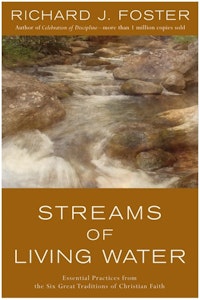 Excerpt from Streams of Living Water
Excerpt from Streams of Living Water
On numerous occasions Amos took aim at the liturgical life of Israel, but no outburst was more scathing than this first-person diatribe against their vain worship:
I hate, I despise your festivals, and I take no delight in your solemn assemblies. Even though you offer me your burnt offerings and grain offerings, I will not accept them; and the offerings of well-being of your fatted animals I will not look upon. Take away from me the noise of your songs; I will not listen to the melody of your harps. But let justice roll down like waters, and righteousness like an everflowing stream. —Amos 5: 21 – 24
The intensity and passion of this passage is breathtaking! God is the speaker now, and in powerful parallelisms he scorns the empty worship of the people and demands that they give a ceaseless exhibition of justice. All three elements of Israel’s liturgical worship come under review here, and all three are soundly rejected.
Israel gloried in her joyous festivals and solemn assemblies. (Actually, the word solemn is not the best translation of the adjective here; ceremonial would catch the sense better.) These events were exuberant, noisy celebrations filled with color and pageantry. But God’s rejection of these festive events is stated in the strongest language possible: “I hate, I despise … I take no delight.” Why would God so utterly repudiate these great festival events in his honor?
The religious rituals of the sacrifices and the offerings are likewise rejected. The burnt offering, in which the animal sacrifice was completely consumed on the altar, represented a total giving of the person to God. The grain offering, in which tribute from the harvest was paid to God, represented the giving of life and resources to God. The peace offering, in which part of the animal sacrifice was burnt and part was shared as a meal between the priests and the worshipers, represented devotion to God and communion with each other. But God will not accept them, will not even look upon them, declares Amos. Why would God so completely reject these offerings made in his name?
Finally, God declares his displeasure with the community’s songs of worship. What a contrast that denunciation of song is to the call to worship issued by the Psalmist:
Praise the LORD with the lyre; make melody to him with the harp of ten strings. Sing to him a new song; play skillfully on the strings, with loud shouts. —Ps. 33: 2 – 3
Why would God turn a deaf ear to the worship music of his people?
The circle has been completed. Each major area of Israel’s liturgical worship — festivals, sacrifices, music — has been evaluated and soundly condemned. But why? Why would these acts of devotion be so utterly spurned? Was it because of ritual impurity? Was it because of compromise with Canaanite religious practices? Was it because of a lack of zeal in religious exercises? No, no, and no. One reason, and one reason alone, accounted for God’s forthright rejection of their religious devotion: all of the festivals, all of the sacrifices, all of the instruments and music of worship failed because they were not accompanied by acts of justice and righteousness. And so the word of the Lord thunders forth:
Let justice roll down like waters, and righteousness like an everflowing stream.
For Israelites this was graphic imagery. Living in the desert, they knew well the characteristics of the wadi, the streambed. Much of the year the wadi is bone-dry and of no benefit to anyone, but when the rains come, the first rushing wall of water flows with such force that anyone caught in the wadi will surely be swept away and drowned. And so Amos calls for justice (mishpat) to roll down like the raging torrent in a freshly fed wadi. Yet unlike that water in the wadi, which often dwindles to nothing, this righteousness is to be an everflowing stream, flowing day after day, year in and year out, under good circumstances and bad:
Let justice roll down like waters, and righteousness like an everflowing stream.
God, you see, demands something more revolutionary than festivals and sacrifices and worship songs. And that “something more” is social righteousness: impartiality in judicial decisions, equity in business dealings, justice for the poor and the oppressed. Because social righteousness is a divine mandate, liturgical life can never be divorced from it.
Foster, Richard J.. Streams of Living Water: Celebrating the Great Traditions of Christ (pp. 149 – 151). HarperCollins. Kindle Edition.
Photo by Timothy Eberly on Unsplash


